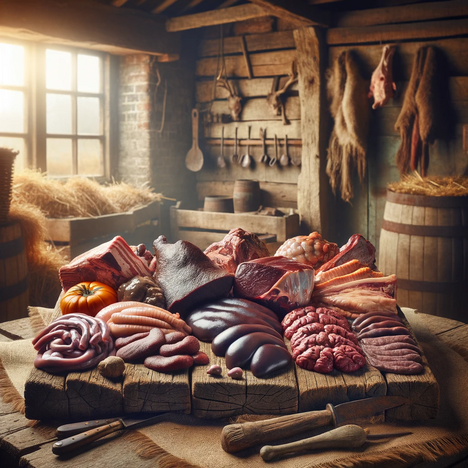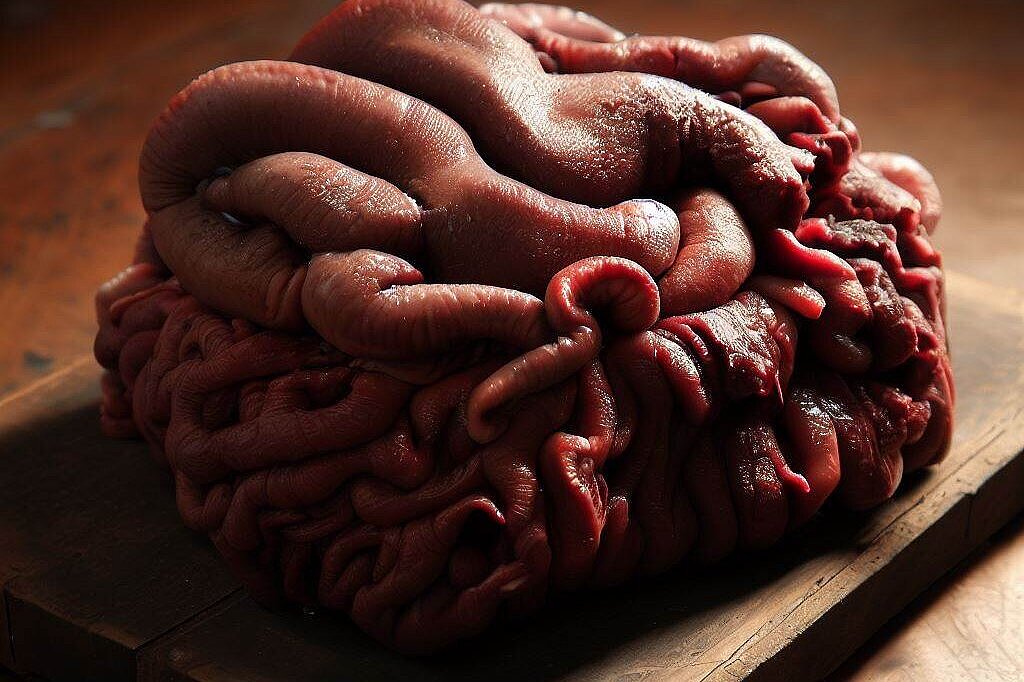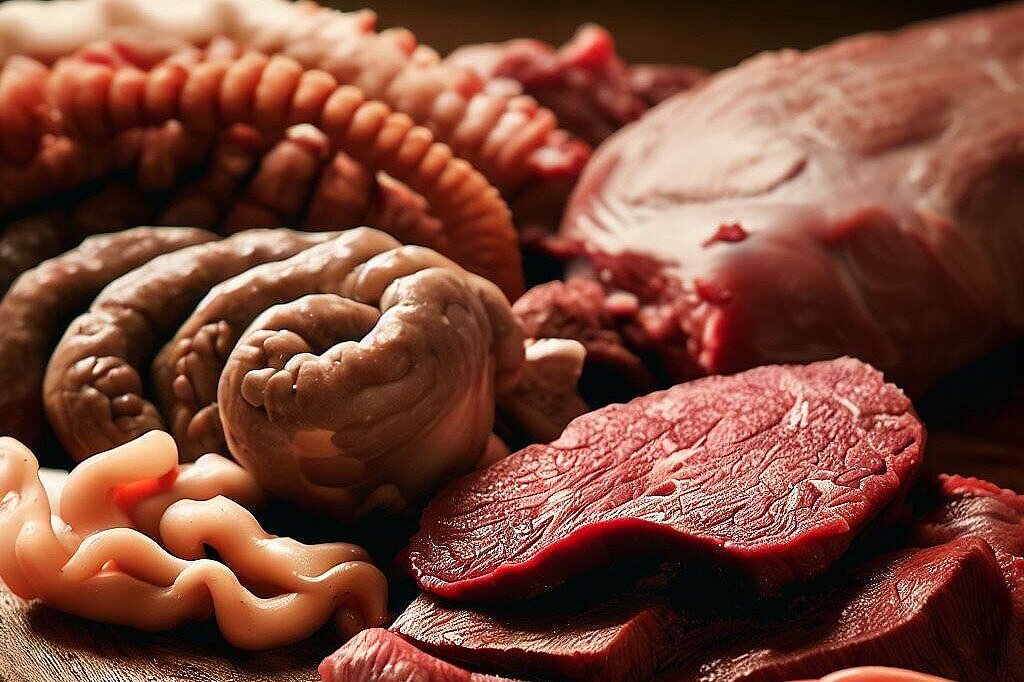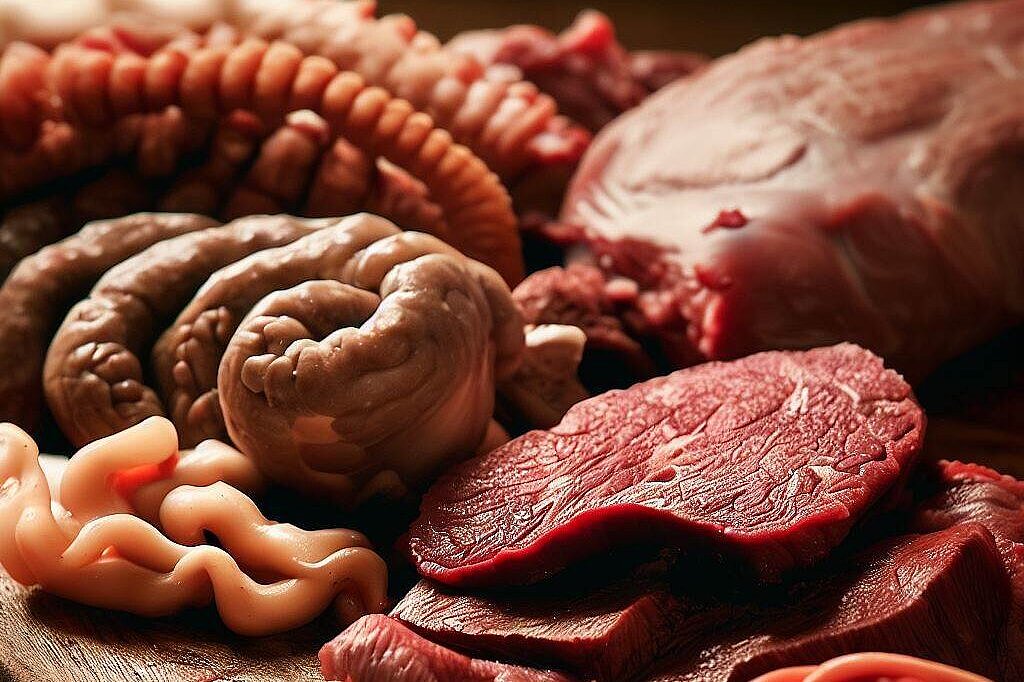Beef offal

Beef offal is more than just a tasty treat for dogs. They contain many important nutrients that your dog needs to stay healthy. But which offal is particularly recommended? How often and how much should you feed them? And what do you need to bear in mind when preparing them? This article will tell you everything you need to know about beef offal for dogs.
What is beef offal?
Beef offal are the edible internal organs of cattle. These include, for example
These organs have different functions in the bovine body and therefore also contain different nutrients. For example, the liver is responsible for metabolism and detoxification, the heart for blood circulation and the kidneys for the excretion of waste products.
What are the benefits of beef offal for dogs?
Beef offal is very healthy for dogs because it provides them with many vitamins, minerals, trace elements, fats and proteins that they need for their vitality. For example, beef offal contains
- Iron: important for the formation of red blood cells and oxygen transport
- Copper: important for the formation of bones, cartilage and connective tissue
- Zinc: important for the immune system, wound healing and skin health
- Selenium: important for thyroid function and cell protection against free radicals
- Vitamin A: important for vision, skin health and the immune system
- Vitamin D: important for calcium absorption and bone structure
- Biotin: important for skin, hair and claw health
- B vitamins: important for metabolism, nerve function and blood formation
Beef offal is also very tasty for dogs and can provide variety in their diet. They can also be given as a reward or snack between meals.
What are the disadvantages of beef offal for dogs?
Although beef offal is very nutritious, it is also very substantial. This means that they should not be fed in excessive quantities or too frequently, as they can otherwise lead to an oversupply of certain nutrients. For example, too high an intake of vitamin A can lead to symptoms of intoxication such as vomiting, diarrhea, loss of appetite or bone damage. Too high an intake of iron can lead to gastrointestinal complaints or liver damage.
Some dogs can also develop an intolerance or allergy to beef or certain offal. This can manifest itself in symptoms such as itching, skin rashes, ear infections or diarrhea.
How often and how much beef offal should you feed your dog?
Beef offal should not be the main ingredient in your dog's diet, but rather a supplement to muscle meat or dry food. As a rule of thumb, offal should make up around 10 to 15 percent of the total amount of food. This corresponds to around 100 to 150 grams per day for a dog weighing 10 kilograms.
You should not give your dog offal every day, but at most two to three times a week. You can alternate between different types of offal to ensure a balanced supply of all nutrients. For example, you can give your dog liver on one day, heart on another day and rumen on a third day.
How should you prepare beef offal for your dog?
Beef offal can be given to your dog raw or cooked. If you feed them raw, you should make sure that they are fresh and of good quality. You should wash them thoroughly before feeding them and cut them into smaller pieces if necessary. You should also freeze them beforehand to kill any pathogens.
If you cook them, you should only cook them briefly in water or broth without adding salt or spices. You should not cook them for too long, otherwise many nutrients will be lost. You can also puree the cooked offal or mix it with other ingredients such as vegetables or rice.
Beef offal is a valuable food supplement for dogs, providing them with many important nutrients. However, they should only be fed in moderation and not too often in order to avoid an oversupply. You should also pay attention to the quality and preparation of the offal and monitor your dog for possible intolerances or allergies. If you follow these tips, you can offer your dog a healthy and tasty change with beef offal.
If you notice any signs of hypersensitivity or poisoning in your dog, you should see your vet immediately. We are not a substitute for a vet, but we try to be as accurate as possible. Every dog reacts differently and we recommend you get a second opinion or consult your vet if in doubt.
Stay healthy and take good care of your four-legged friend!😊
Similar to Beef offal
Buffalo offal has several benefits for dogs that make it a valuable addition to a dog's diet. Here are some of them: Buffalo offal is rich in protein, which is important for building muscle and...
Lamb offal has several benefits for dogs, which we would like to present to you here: Lamb offal is a natural and species-appropriate food source for dogs that meets their instincts and needs. Dogs...
Horse offal is the innards of horses, i.e. organs such as the heart, liver, kidneys, lungs, spleen or stomach. They contain many valuable nutrients such as protein, iron, vitamin A, B vitamins and...
Pork offal can be a useful addition to dog food, especially if you are feeding your dog barefoot or cooking it yourself. They contain many nutrients that your dog may otherwise not get enough of,...



